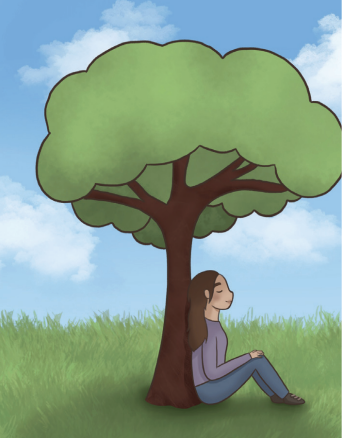Lauren* had a falling out with her closest friend over the summer. She returned to campus in the fall to multiple emails from Marlborough faculty asking how she was doing. She noticed that teachers began looking at her a second longer in the halls, always with encouraging smiles. She felt that faculty were observing her too carefully and that their attention fed gossip among her classmates.
School administrators try to make sure that every student feels part of a nurturing environment that provides appropriate help and support. Head of Upper School and Assistant Head of School Laura Hotchkiss ‘86 explained that when student issues arise, they are always handled by her and School Counselor Emily Vaughn. When Hotchkiss and Vaughn perceive a noticeable change in a student’s emotional state or physical appearance, they either contact the student directly or arrange a meeting with the student’s parents to discuss the perceived problem. In some cases, when a teacher is concerned about a student experiencing a personal problem, the teacher reports his or her concern to Hotchkiss and Vaughn.
“We don’t want to overreact, but we don’t want to ignore changes either,” Hotchkiss said.
School administrators try to make sure that every student feels part of a nurturing environment that provides appropriate help and support.
And, even though some students’ situations may require special assistance or intervention, many girls feel that, rather than being helped by the School, they are being harmed. Consequently, some girls react by resolving to conceal their problems.
“When you feel like you’re in trouble for something or you feel like other people know about your problems, you feel more embarrassed and ashamed and are more likely to take it out on yourself,” Katherine* admits.
Some students feel that teachers try too hard to talk to them about their personal lives, which can feel like a violation of their privacy.
“I appreciate their concern, but once a student and their parents tell [the faculty] that their assistance is not needed or wanted, they continue to force involvement, which feels really invasive,” a student explains.
For some students, the School has become a place where they must consciously act a certain way in order to avoid contact with members of the community who they perceive are looking to mix academic and personal concerns. Many students find that the School’s approach goes beyond what is necessary.
Olivia* struggled with her grades during her junior year and felt that the faculty’s persistent attempts to help her constantly reminded her of her issue, making it worse.
“I would be on my way to class, and a random teacher would ask me how I was doing. It wasn’t from a small talk friendly place; it felt like it was for school purposes, like they were just trying to get to the bottom of something so they could fix it,” she said.



